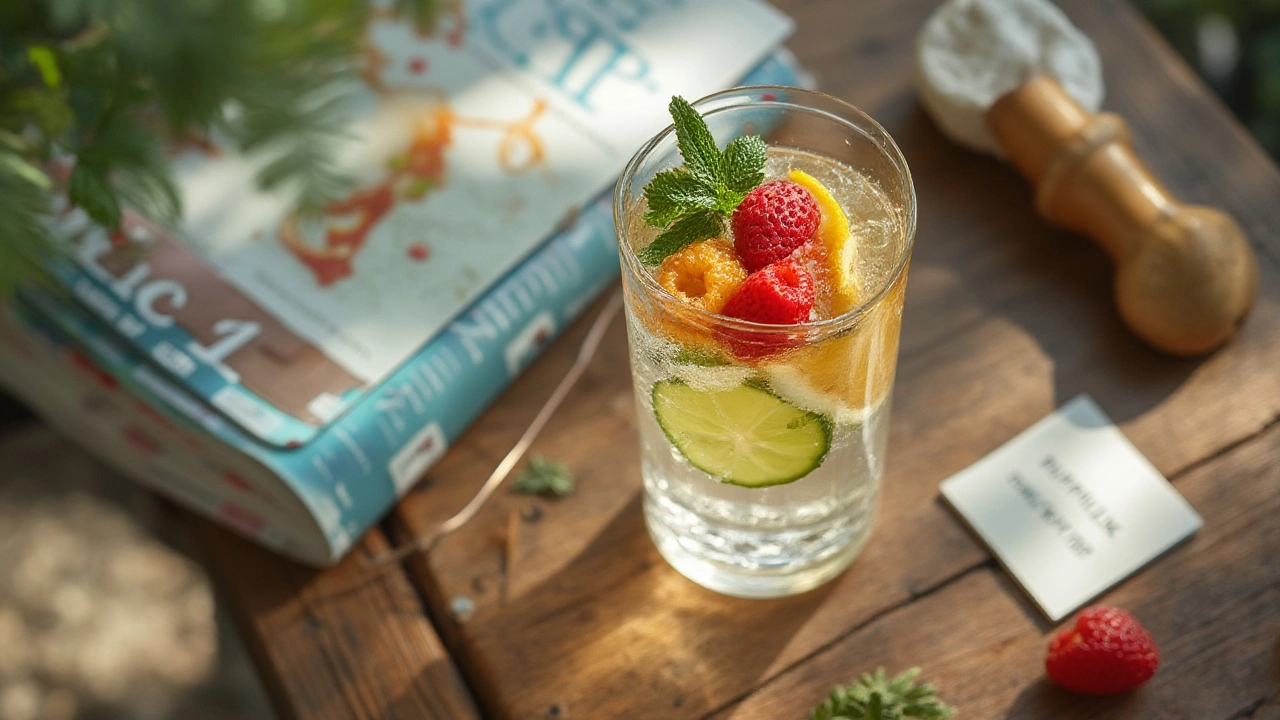You’re standing in front of the fridge, fighting off the nagging temptation of sugary sodas and those flashy bottles promising energy. It’s not about resisting one bad choice — it’s about hoping there’s a clear winner that actually tastes good and does your body a favor, instead of a chore. The truth is, deciding on the healthiest non-alcoholic drink isn’t as clear-cut as you’d think. Drink companies love to slap buzzwords on labels, but what’s the real story behind the healthiest choice? Is there a drink that nails hydration, nutrition, and taste — and still works whether you’re at the gym, crushing work deadlines, or negotiating snack time with your kids?
The Basics: What Makes a Drink Healthy?
Before going down the rabbit hole of trends and superfoods, let’s simplify: a healthy drink should do at least three things well. First, hydrate you properly. Second, provide nutrients your body actually uses. Third, go easy on the stuff that drags you down — sugar, artificial junk, unnecessary calories. Sounds simple, but you’d be shocked by how many drinks fumble the ball on at least one of these.
So, what exactly is hydration? It’s not just about quenching thirst. Every system in your body — muscles, digestion, even moods — depends on water. Dehydration can make you sluggish, confused, even cranky. Kids lose focus at school; adults can get headaches or struggle with exercise. According to the European Food Safety Authority, men should aim for about 2.5 liters of fluids per day, women around 2 liters — and no, beer doesn’t count.
On the nutrient side, your healthiest picks sneak in bonuses you actually want: vitamins, minerals, natural electrolytes, maybe even plant compounds. You might think, 'I’ll just pick up a fruit juice — that has vitamins.' Juice is tricky. Many juices are basically liquified sugar bombs. Sure, orange juice packs vitamin C, but a single cup holds more sugar than most sodas, and way less fiber than you’d get from eating an actual orange.
Artificial sweeteners? They may score zero on calories but come with murky science about how they mess with your metabolism and gut. Generally, the closer a drink is to what you’d find in nature — think water, herbal teas, or homemade infusions — the better off you are.
Why Water Still Rules (But There’s More to the Story)
Let’s just say it: water is literally the MVP. No sugar, no additives, no aftertaste. Your brain, muscles, skin, and digestion all need it to run the show. If you just want the healthiest answer, here it is: water takes the crown every day of the week and twice on Mondays. Years ago, I switched our family mealtime drinks to water, and Lennox actually stopped asking for soda after a while — the cravings just faded.
Here’s the kicker: sometimes, plain water isn’t always enough. If you’re sweating buckets at the gym, hiking all afternoon, or sick (think gastro bugs with Lennox and Evanna), your body also needs electrolytes — things like potassium, sodium, magnesium. Water’s great at basic hydration, but it doesn’t replace minerals lost from sweat or illness.
That’s where you might see people reach for sports drinks. Problem? These often come with mountains of sugar, fake flavors, and colors not found in nature. If you want to DIY this solution, a little pinch of sea salt, squeeze of lemon, and a splash of 100% juice in your water can do the trick, minus the sugar rush.
Check out how water stacks up against popular non-alcoholic choices:
| Drink | Sugar (per 250ml) | Calories | Main Benefit |
|---|---|---|---|
| Tap Water | 0g | 0 | Hydration |
| Orange Juice | ~21g | ~115 | Vitamin C |
| Sports Drink | ~18g | ~80 | Electrolytes (plus sugar) |
| Herbal Tea | 0g | 0 | Antioxidants |
If you get bored with plain water, jazz it up. Infuse it with sliced cucumber, a sprig of mint, or berries. Even my kids love “fancy water” with floating fruit — it makes them feel grown up, and it’s as healthy as it gets.
Plant-Powered Picks: Herbal Teas and Natural Infusions
If you want your drink to do more than just hydrate, herbal teas have a lot going for them. We’re not talking about teas with caffeine (like black or green tea), which can perk you up but might make you jittery if you drink them late. Herbal teas, like chamomile, peppermint, or rooibos, cost almost nothing, carry zero sugar, and often come packed with antioxidants that fight inflammation.
Let’s clear something up: antioxidants aren’t a miracle cure, but real studies show they protect cells from damage. Chamomile, for example, isn’t just for your grandma — research from the University of Nottingham found it can help with sleep and soothe nerves. Peppermint tea? A study out of Wheeling Jesuit University showed it helped participants feel more alert and improved their memory. And with kids around, it calms tummies just as well as any chalky pharmacy fix.
The best infusions? Try dropping slices of ginger, lemon, or fresh herbs (like basil) into hot or cold water. They pull out natural plant compounds and give you extra flavor. Hibiscus tea is another home run: it’s rich in vitamin C and, per a 2023 study in the Journal of Nutrition, can slightly lower blood pressure in adults — without any sugar added.
These drinks are easy to make and cost pennies per glass. Since they’re so low in calories, you can sip them all day without thinking twice. Kids can join in too. We call it our “nighttime potion” when Evanna and I use chamomile with a drizzle of honey before bed. And unlike juice, the cleanup is just tossing out a tea bag or strainer full of peels.

The Surprising Truth about Juice, Kombucha, and Plant Milks
Juice seems healthy — and sometimes, it is. Pure vegetable juices (think beet, carrot, or leafy greens) do bring vitamins, minerals, and a bright color to your glass. But fruit juices trick you because they’re stripped of fiber and often have as much sugar as soft drinks. For kids, the American Academy of Pediatrics recommends no more than 120ml (about half a cup) per day.
Kombucha is all over Instagram, but its health halo needs a reality check. It’s a fermented tea, slightly fizzy, with probiotics (good bacteria for your gut). Early research suggests probiotics can help with digestion and immunity, but store-bought kombucha often comes loaded with added sugar — and “claims” that aren’t always backed up. If you like kombucha, go for brands with under 5g sugar per 100ml, and drink it because you genuinely like the taste, not just for the hype.
Plant milks — almond, oat, soy, coconut — can be a healthy upgrade or a nutritional miss. Unsweetened soy milk is probably the closest swap for dairy, with just about as much protein. Oat milk is smooth and mixes great in coffee, but double-check for added sugars. Many brands sneak in sweeteners, oils, or gums, which aren't bad in small amounts, but you might want to avoid if you’re chasing the healthiest option.
There’s no gold medal here, but if you’re picking juice, favor 100% vegetable or a mix of veggie and fruit juice (heavy on the veggies). For kombucha, aim low on sugar and remember it’s still an occasional drink. For plant milks, go unsweetened and shake the carton before pouring — the good stuff settles on the bottom.
At-Home Tips for Healthier Non-Alcoholic Drinks
Want to save money and dodge unnecessary junk? Make your own drinks at home. Start with a water base, then experiment from there. Here are a few tried-and-true favorites in our house:
- Fruit Herb Infusion: In a big pitcher, add lemon slices, berries, and a handful of mint. Fill with cold water. Let it sit for an hour, then drink up. The flavors get stronger the longer it chills.
- Homemade Sports Drink: Mix 1 liter of water with the juice of one lemon or orange, a pinch of sea salt, and a teaspoon of honey if you like things sweet. This is my go-to after sweaty summer yard work — you actually feel refreshed, not sticky and wired.
- Simple Iced Herbal Tea: Brew double-strength peppermint or hibiscus tea, chill it on ice, and add sliced cucumber or apple.
- Veggie Juice Fix: For the days you feel like a health nut, blend cucumber, celery, spinach, and an apple. Drink it within a few hours for the biggest nutrient punch.
- Kid-Friendly Fizz: Mix sparkling water with a splash of 100% fruit juice. My daughter Evanna calls this “party water.” Tiny bubbles, big flavor, low sugar.
When possible, use a reusable bottle to cut down on plastic waste (my kids have spill-proof ones with their names in marker — saves fights and landfill).
Here’s one thing to keep on your radar: adults need to watch caffeine, while kids should avoid energy drinks and anything with mysterious “boosters.” And don’t feel pressured to jump on every health trend that blows up on social media — the basics (water, teas, simple infusions) rarely go out of style for a reason.
So, What’s the Healthiest Non-Alcoholic Drink, Really?
If you’re after the honest answer, it boils down to this: plain water is best for hydration, but herbal teas, fruit and veggie infusions, and low-sugar plant milks earn their place when you want a little more. These options don’t just hydrate — they pack flavor, offer real nutrients, and avoid the sugar crash. When you get creative at home, you can tweak the flavor, keep sugar and calories in check, and make it fun for everyone (yes, even the picky eaters).
No matter what brands tell you, the healthiest non-alcoholic drinks are the ones you can pronounce, recognize from your own kitchen, and make without a chemistry degree. You don’t need a liquid miracle. You just need a glass, some fresh water, and maybe a slice of lemon or a sprig of something green.
The healthiest drink choice? The one that keeps you hydrated, gives your body some love, and helps you dodge the sugar rollercoaster — all without turning drink time into a science project or a fight with your kids. Refill, enjoy, and feel good about it. That’s a healthy habit any of us can stick to.


